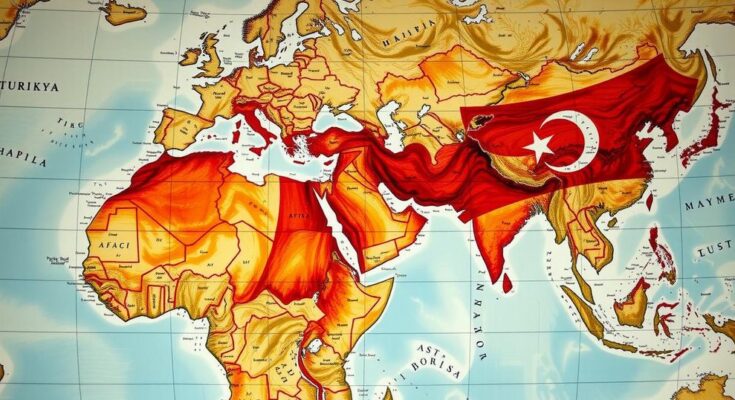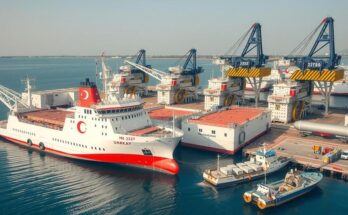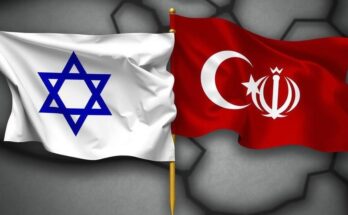The Ankara Declaration, signed on December 11, facilitated by Türkiye, eased tensions between Ethiopia and Somalia amid an escalating dispute involving Somaliland’s push for recognition. The agreement addresses critical issues of military presence and port access, positioning Türkiye as a key influencer in the region’s stability, amid complex geopolitical pressures including potential U.S. recognition of Somaliland and the UAE’s investments in the area.
The Ethiopia-Somaliland dispute previously posed a significant threat to the stability of the Horn of Africa, prompting concerns of potential proxy conflicts akin to those seen during the Cold War. In a significant diplomatic development on December 11, Türkiye facilitated the signing of the Ankara Declaration between Ethiopia and Somalia, easing longstanding tensions by addressing critical issues such as the status of Ethiopian troops in Somalia and Somaliland’s aspirations for international recognition. This agreement notably positions Türkiye as a pivotal player and bolsters its influence within the region.
The escalation in tensions began following Ethiopia’s January 1, 2024, announcement of a Memorandum of Understanding (MoU) with Somaliland, which sought to grant Somaliland diplomatic recognition in exchange for access to its port for Ethiopia’s landlocked economy. The move, however, posed a direct challenge to Somalia’s sovereignty since the latter views Somaliland as an integral part of its territory. Furthermore, this agreement had implications for the United Arab Emirates (UAE), which invested heavily in the development of Somaliland’s Berbera port, further complicating regional dynamics.
As the situation intensified, Somalia declared Ethiopia’s agreement null and void, warning of potential military action. Ethiopia’s evolving relationships also provoked Egypt, who, embroiled in a contentious dispute over Nile water sharing, formed a coalition with Somalia and Eritrea aimed at countering Ethiopia’s influence. Continued instability was further fanned by the prospect of the incoming U.S. administration under Donald Trump recognizing Somaliland, causing further friction in regional allegiances.
Throughout this turmoil, Türkiye’s assistance to Somalia has been significant, originating from long-term relationships nurtured by President Erdoğan, who has facilitated humanitarian, military, and infrastructural investments in the country since 2011. The Ankara Declaration has thus played a crucial role in fostering dialogue between Ethiopia and Somalia, creating political grounds for Ethiopian military presence and future negotiations on port access.
The Biden administration has expressed support for the Türkiye-brokered deal, emphasizing enhanced cooperation and maintaining territorial integrity. Nonetheless, Ethiopia’s alignment with Somalia introduces complexities concerning its prior arrangement with Somaliland, potentially prompting further strategic considerations involving future maritime access in the Red Sea.
The strategic balance maintained by Ethiopia among Somaliland and Somalia reflects a delicate approach, as the Ankara Declaration opens channels of diplomacy despite the uncertain geopolitical landscape. Ultimately, Türkiye’s role in facilitating this accord stands as a testament to its growing diplomatic ambitions in Africa, influencing the regional balance while addressing local conflicts.
The Horn of Africa has been characterized by longstanding conflicts and territorial disputes, particularly involving Somalia, Somaliland, and Ethiopia. The dynamics shifted significantly following Ethiopia’s controversial acknowledgment of Somaliland, challenging Somalia’s stance on its territorial integrity. Türkiye has emerged as a key moderating force, leveraging its historical relationships and investments in the region. The ongoing interests of international players including the UAE and the incoming U.S. administration further amplify the situation, describing a region increasingly shaped by outside influence amid regional aspirations for stability and recognition.
The Ankara Declaration between Türkiye, Ethiopia, and Somalia marks a pivotal moment in the often-turbulent geopolitics of the Horn of Africa. By mediating this agreement, Türkiye has enhanced its influence in the region while accommodating complex territorial disputes. The endorsement from the U.S. further legitimizes this endeavor, yet the mutual aspirations of Ethiopia and Somaliland demonstrate the persistent challenges ahead. The evolving alignments and strategic actions in the Horn of Africa will necessitate careful diplomacy and stakeholder engagement to sustain peace and stability in the region.
Original Source: www.orfonline.org




